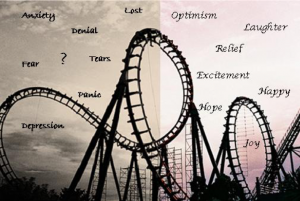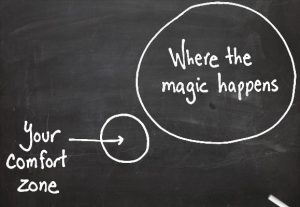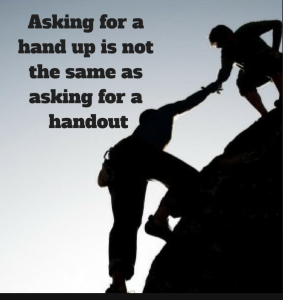Part One – Five Things to Know When Knocked Down – “The Power of Knowledge”
#1 Life is a Rollercoaster
The teen heroic journey is a rollercoaster. All journeys of change are rollercoaster, regardless of age or setting. Recovering from a trauma is its own rollercoaster experience. That’s just the way it works. There are lots of ups and downs and twists and turns. There will be progress and setbacks, some easy terrain and some rough terrain with roadblocks and pitfalls. There will be excitement and anxiety, hope and fears and confidence and doubts.

It’s important to get energy from the ups and manage the down times. It’s important to find companions on the journey, create a web of support, manage your energy, and develop your ability to persevere and become increasingly resilient.
Success is not final, failure is not fatal; it is the courage to continue that counts.
Winston
Churchill
#2 All Three Core Teen Challenges Will be in Play
All teenagers face three core challenges on the journey. When you are knocked down you you may suffer setbacks in your growth in one or more of these challenges and you may be presented with opportunities to accelerate your growth.
Challenge #1 – “Identity.” As a teenager you are challenged to define your identity as a young adult – “Who am I.”
Challenge #2 – “Relationships. You are challenged to develop new and/or more mature relationships – with parents, peers, romantic partners and other adults. “How am I connected?”
Challenge #3 – “Competencies. You are also challenged to build the competencies required for success as a young adult – academic competencies, self-management competencies and life skills. “What am I capable of?”
You can be tested by any of these challenges as you recover from being knocked down. How that looks will vary from person to person, but there will be opportunities to accelerate growth – even if they don’t exactly feel like opportunities. Those opportunities to accelerate growth may be in only one area of challenge or they may be in more. You’ve been knocked down. How you get up matters, and focusing on developing in one or more of these three challenge areas can make a difference.
Throw me to the wolves and I will come back leading the pack.
Unknown
#3 The Three Key Tests on the Journey Will be in Play
On any journey of change there will be three very different types of test that come with the three core challenges. This is true for the teen journey, for adult journeys and even for corporate changes. (1) You must let go of old ways of thinking and behaving and relating. (2) You must discover and master new ways. (3) You must deal with being in between letting go and mastery, called “inbetweenity.” It’s the same for the specific journey involved in recovering from being knocked down.
Test #1 – Letting Go. “What do I need to let go of?” You may need to let go of a surprising number of things. They can range from some relationships and beliefs to habits, perceptions and even places you want to be. You’ve been victimized, so it’s likely you will feel like a victim. Feeling like a victim is one of the things you will need to fight to let go of as you get back in the author role.
Getting over a painful experience is much like crossing monkey bars. You have to let go at some point in order to move forward.
C. S.
Lewis
Test #2 – Discovery and Mastery. “What do I need to Discover and Master (or just get good at)?” The test here is discovering what you need to bring into your life. That can range from people and relationships to competencies or new ways of thinking about yourself. Discovering what you need is part of the test. Getting good at – or mastering – the new ways is the other part.
Test #3 – Dealing with “Inbetweenity.” You will be tested to manage the often weird and confusing period between letting go and discovery and master – and that can be a long period. In that “inbetweenity” there are a lot of what are called “dynamic tensions” that push and pull in different ways and are hard to resolve one way or the other. They can range from hope vs. doubt and uncertainty vs. certainty to confidence vs. doubts and feeling connected vs. feeling unconnected. Being aware of these “dynamic tensions” can give you a lot of influence over how they affect you.
Life isn't about waiting for the storm to pass. It's about learning to dance in the rain.
Vivian
Greene
#4 You May be Tested and Grow on Five Levels
We don’t develop in our comfort zones. We grow mostly when we are challenged and tested. When knocked down, you will be affected on one or more of these five levels. Sometimes the challenge will be to get back to where you were before getting knocked down. But, in most cases, you will have the opportunity to accelerate your growth.

The five levels on which development happens as a teenager are:
- Physical Level. Often physical diminishment is significant and long lasting. Other times it’s not much of an issue.
- Intellectual Level. You may be challenged to make sense of your experience and problem-solve to figure out how to respond. You may also have to struggle with confusion, conflicting thoughts or new ways of thinking about things. And old beliefs and understandings may no longer hold true.
- Emotional Level. It’s almost impossible to be knocked down and not be affected emotionally. That can range from a diminished sense of safety or confidence to anger, anxiety or depression. You may also find an increased sense of courage or refusal to be a victim.
- Social Level. The impact here can vary widely. It can strengthen connections with others or undermine them. People can rally around you or pull away. Your trust in others can be strengthened or stressed. And you can find new ways of relating.
- Spiritual Level. There is a wide range of potential impact, from minimal to significant. There can be an increased sense solace and of connection to a faith or faith community or there can be a sense of disconnection or abandonment.
The key questions are, “What is going on for me on each of these levels and what do I want to do about it?” Those are big questions, so talking with others and getting support is central to becoming the author.
You will be outside your comfort zone, but you can be OK and that’s where the most growth happens – not all the growth, but most of the growth.
The most beautiful people we have known are those who have known defeat, known suffering, known struggle, known loss and have found their way out of the depths. These persons have an appreciation, a sensitivity, and an understanding of life that fills them with compassion, gentleness and deep loving concern. Beautiful people do not just happen.
Elisabeth
Kubler-Ross
#5 Help and Support is Available – and Important
“Heroes don’t go alone.” You deserve support and it makes a critical difference. Heroes never go alone (and succeed) in the movies, stories or myths and we don’t go alone in the human-sized journeys of change we experience in our lives. This is particularly important when thrown into a journey by a trauma.
Support can come from a surprising number of sources. It can come from parents and extended family members, peers, professionals, school and faith community members, etc. It can also come from your surroundings, habits or rituals, new activities or current activities.
The key is creating a web of support that has as many elements as possible. That means that you can get support from a number of sources and you don’t risk overwhelming any one or two sources. One way to identify a surprising number of sources is to ask yourself, “What can I do and who can support me on a physical level, an intellectual level, an emotional level, a social level or a spiritual level?”
Support might be readily available or you may need to stretch to find it. You might be naturally good at connecting with others or taking care of yourself or that might be hard for you. If you’re not good at getting support, take the risk and make the effort and don’t give up if you are not immediately successful. Support is important throughout life, so this might be an opportunity to get good at creating it.
You may need to “help people to help you.” People may not know you need help or how to help you, so you might need to provide some very direct guidance.
